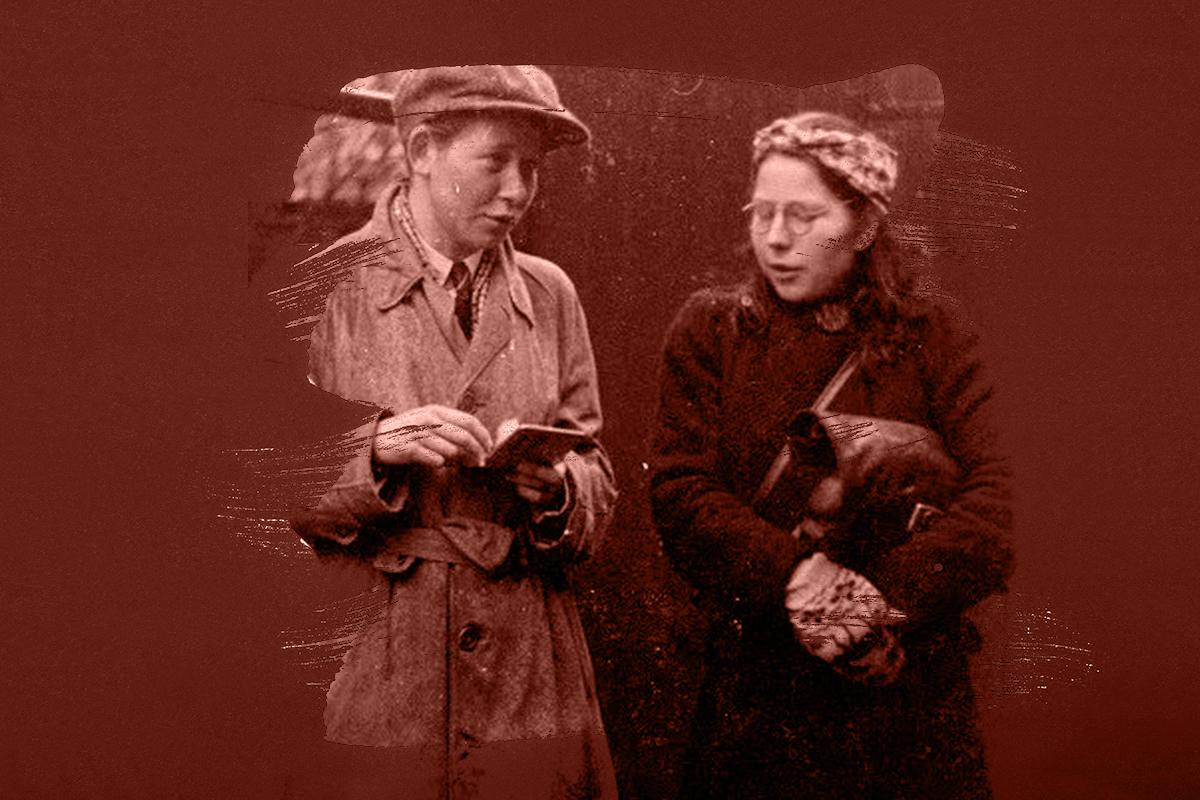Jews love repetition. I think this is an openly accepted truth about the Jewish people, but if you want evidence, look no further than songs like “Dayenu” and “Hava Nagila,” or the more somber stories of the Holocaust we vow to never forget.
Thus, it is the Jew in me that thinks this widely repeated sentiment is worth repeating again: The violent, planned attack on the United States Capitol was a dark day for American democracy. A mob of insurrectionists, armed with guns, zip ties, and the President’s support, attempted to overthrow the results of a free and fair election. The Confederate Flag, at least one shirt mocking Auschwitz, and other symbols of hatred were proudly marched through the Rotunda, and five people died.
But in the aftermath of these events, some of which has been equally infuriating and sad, I have somehow found a moment of encouragement in an extremely unlikely place: Twitter.
As I was doing my nightly doom-scroll through my Twitter feed last week, I came across this viral tweet.
https://twitter.com/DrLisaCorrigan/status/1349542291636150281
From user @DrLisaCorrigan, it reads, “Get in girls. We’re going hunting,” and is in reference to a tweet exchange wherein another user, @allisonnorris, writes, “I know a friend of a friend who changed her preference on Bumble to Conservative. She’s matching with MAGA bros and they’re bragging and sending her pics and videos of them in the Capitol. She’s sending them to the FBI.”
In the midst of my feelings of helplessness, I was struck by the badassery of a woman using her seductive powers and harnessing men’s underestimation of her to takedown fascists. But I was also struck because this isn’t the first time in history Nazis have been allured and outwitted by powerful women. History does indeed repeat itself, so let’s talk about World War II Dutch Resistance fighters Freddie Oversteegen, Truus Oversteegen, and Hannie Schaft.
In May 1940, Nazi Germany brutally invaded the Netherlands, forcing a quick surrender from the Dutch Army. Almost immediately, the lives of Dutch Jews and the many Jewish refugees who had fled Germany for Holland were changed for the worse. Antisemitic measures were legalized under the Nazi-occupation government; Jewish newspapers were closed, Jewish government workers were fired, Jewish businesses were ransacked, and there was a mass expulsion of Jewish students from their schools and universities. In the following year, all Jews residing in the Netherlands were forced to register themselves with the Nazis.
Enter the Dutch Resistance.
The Dutch Resistance was an extremely well-organized group who deeply opposed the Nazis and worked to sabotage their plans in the the Netherlands. In 1940, two Dutch sisters caught the eye of a local resistance commander. The girls were Freddie and Truus Oversteegen. Despite their youth (Freddie was just 14 years old at the time, and Truus was 16), the pair had already engaged in resistance work of their own, thanks to their mother. Trijntje van der Molen, single mother to Freddie and Truus, welcomed Jewish refugees into their apartment starting in the 1930s. After the Nazi occupation, Trijntje’s communist leanings made it dangerous to continue harboring Jews, but their work did not stop there. As a family, they distributed anti-Nazi leaflets and vandalized signs calling for Dutch men to work and support the war effort in Germany. So with their mother’s blessing, and her directive to “always stay human,” Freddie and Truus were recruited to join the Dutch underground movement.
From there the teenagers joined a cell of other resistance fighters, where they met Hannie Schaft. Schaft, 24 years old at the time, was a former law student who had dropped out of university because she refused to pledge loyalty to the Germans. The girls became fast friends and skilled saboteurs. Together, they sabotaged bridges and railway lines, reported intel on a German military airport, and broughts Jews, gay people, and political dissidents to shelters. But the trio is most well-known for assassinating Dutch collaborators and Nazi soldiers, and using their sexuality to do it.
In her young teenagehood, Freddie became the first of the three to seduce and lure a Nazi soldier away from a bar into the woods, where she executed him. Later Hannie and Truus would also complete missions like this one, as well as drive-by shootings from their bicycles. While there were plenty of women involved with the Dutch resistance movement, Hannie, Truus, and Freddie are so memorable because of how they weaponized their gender, sex appeal, and youth to come across as innocent to Nazis, whom they would then “liquidate.”
Unfortunately, Hannie Schaft did not make it out of the war. Mere weeks before Holland was liberated, she was captured, tortured, and executed by the Nazis. Supposedly, after one of her executioners only wounded her, Hannie exclaimed, “I’m a better shot!” Though devastated by Hannie’s death, Freddie and Truus went on with their lives. In 2014 they were awarded the Mobilization War Cross by the Dutch Prime Minister, however the Oversteegen sisters never revealed how many Nazis they actually killed. Regardless of the number it’s fair to assume that they saved countless lives. Truus passed away in 2016, and Freddie passed away in 2018, leaving the memory of their work through the Hannie Schaft Foundation, which they founded.
To be clear, I am not advocating that the insurrectionists be killed. Nazis were enemy combatants to the Dutch resistance, and in order to save lives and overthrow the Nazi regime, the resistance killed German soldiers. In the words of Freddie Oversteegen, “We had to do it. It was a necessary evil.”
Our circumstances today are very different. In our contemporary context, we have a judicial system, flawed as it is, through which we can and must hold seditionists accountable. But if it is your prerogative to use dating apps and some crafty flirting to root out fascists and report them to the FBI, I have no objections.
My only request is that you see the historic parallel and honor the mitzvot of Freddie, Truus, and Hannie by repeating their story.



